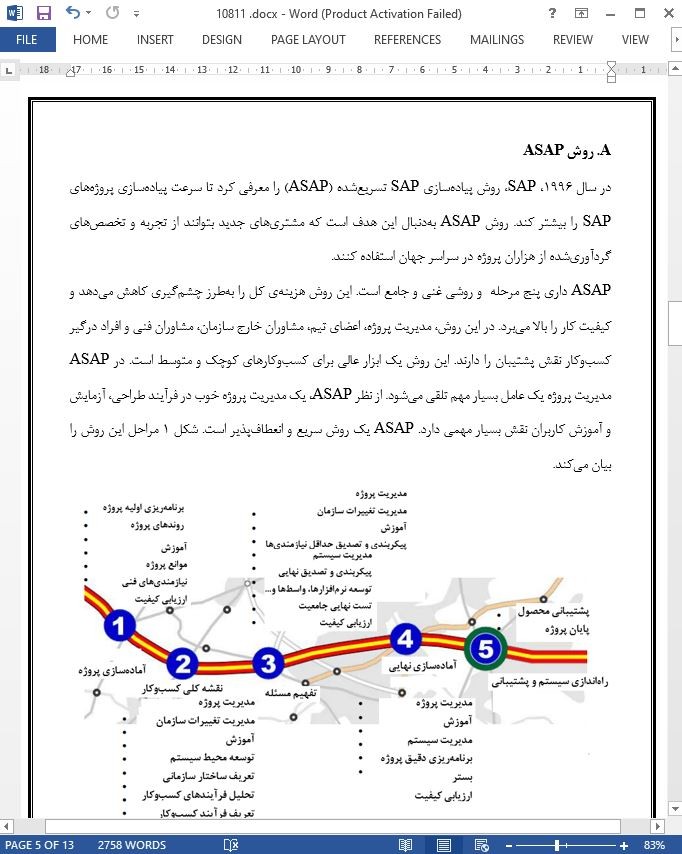
مدل کنترل امنیت در ایجاد سیستم های ERP
چکیده
بستههای نرمافزار ERP سیستمهای گستردهای هستند و پیادهسازی آن با چالشها و دشواریهای فراوانی روبهرو است. پیادهسازی موفق ERP در یک سازمان به عوامل بسیاری وابسته است. این مسئله در اینگونه سیستمها ناشی از ماهیت ویژه و تأثیر آن بر تمام فعالیتها و فرآیندهای سازمان است. با ظهور نرمافزارهای مبتنیبر وب برای حملههای هوشمند، لازم است که حین فرآیند پیادهسازی، امنیت بهبود داده شود. این مقاله مروری دارد بر عوامل کلیدی در روشهای پیادهسازی سیستمهای ERP و این عوامل را موردبررسی قرار میدهد و برای بهبود امنیت در مراحل مهم پیادهسازی، یک رویکرد پیشنهاد میکند.
I. مقدمه
سیستمهای برنامهریزی منابع سازمانی (ERP) درحال تبدیلشدن به یکی از رایجترین راهحلهای امروزی IT است. ابتداییترین کاربرد ERP، یکپارچهسازی تمام زیرسیستمهای سازمان و فعالیتهای کسبوکار است. سیستمهای ERP بستههای نرمافزاری گرانقیمتی هستند که برای تسهیل ایجاد اطلاعات یکپارچه در تمام بخشهای سازمان، مانند بخش تولید، مالی و منابع انسانی توسعه یافتهاند. هزینه پیادهسازی این سیستم بسیار زیاد است و آمادهکردن آن نیز زمان زیادی میبرد.
V. نتیجهگیری
ERP یک راهحل نرمافزاری مناسب برای یکپارچهسازی منابع سازمانی است. ایجاد سیستم ERP برای یکپارچهسازی فرآیندهای وردی تبادل سریع اطلاعات میان بخشهای مختلف سازمان را تسهیل مینماید. یکی از عاملهای کلیدی برای ایجاد یک سیستم ERP بهصورت موفق، روش است که سیستم با آن پیادهسازی میشود. در مراحل اولیهی پیادهسازی میتوان به کنترلهای دسترسی پیبرد و خطاها را رفع کرد و جریانهای امنیتی را ایجاد نمود. این سیستم هزینه مدیریت امنیت را کاهش میدهد. از آنجایی که کنترل امنیت یکی از ویژگیهای مدیریت امنیت و کنترل کیفیت است بنابراین، امنیت در کنترلهایی که در هنگام پیادهسازی انجام میشود درنهایت کیفیت محصول را بهبود میبخشد.
Abstract
Systems ERP software packages are vast and its implementation is facing with many complexity and challenges. The successful implementation of ERP in an organization depends on many factors. The successful implementation of ERP in an organization depends on many factors. This is very important in case of ERP systems due to the specific nature and affect all processes and activities of the organization. With the development of Web-based software to Smart invasions need to improve security during the implementation process there is. In this study reviews key success factors in ERP systems implementation methodologies and factors are discussed, and an approach to improve security during critical phases of implementation are proposed.
I. Introduction
Enterprise Resource Planning (ERP) systems are becoming one of today’s most widespread IT solutions. The primary functions of ERP are the integration of all the enterprises subsystems and business functions, i.e [1]. ERP systems are extensive software packages, That are created to support the development of integrated information in different parts of the organization such as manufacturing, financial, human resources. Cost of implementation this system is very high and it needs longer time for preparation
V. Conclusion
ERP is a software solution beneficial to integrate enterprise resources. Also ERP implementation of integrated admissions processes for the rapid exchange of information between the various sectors and provides. One of the important factors for successful ERP implementation methodologies systems is. During the initial stages of the implementation of security controls can be detected and corrected errors and security flaws are. This system will reduce the cost of managing security. Due to security control is one of the characteristics of the main security control, quality control, thus security of controls in the during, implementation will enhance the quality of products.

چکیده
I. مقدمه
II. عوامل مهم در موفقیت سیستمهای ERP
A. حمایت و تعهد ردههای بالای مدیریت
B. درک واضح از هدفهای استراتژیک
c. آموزش و تربیت گسترده
D. یک تیم پیادهسازی ماهر
E. مدیریت پروژه عالی
F. حامی پروژه
G. طرح کسبوکار و چشمانداز
III. روشهای پیادهسازی سیستمهای ERP
A. روش ASAP
B. روش AIM
IV. کنترل امنیت در سیستمهای ERP
V. نتیجهگیری
Abstract
I. Introduction
II. critical success factors of ERP systems
A. Top Management Support/Commitment
B. Clear understanding of strategic goals
C. Extensive education and training
D. A great implementation team
E. Excellent project management
F. Project champion
G. Business plan and vision
III. Methods of deployment ERP systems
A. Methodology ASAP
B. Methodology AIM
IV. Controlling security in ERP systems
V. Conclusion
- اصل مقاله انگلیسی با فرمت ورد (word) با قابلیت ویرایش
- ترجمه فارسی مقاله با فرمت ورد (word) با قابلیت ویرایش، بدون آرم سایت ای ترجمه
- ترجمه فارسی مقاله با فرمت pdf، بدون آرم سایت ای ترجمه
